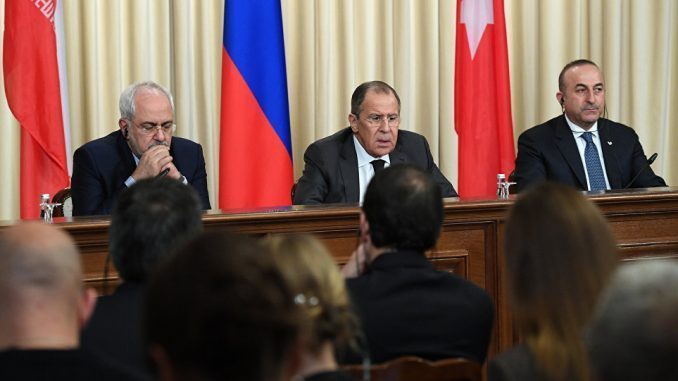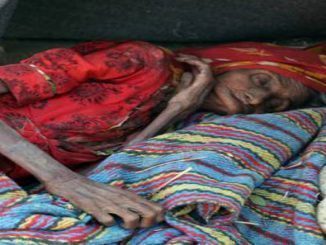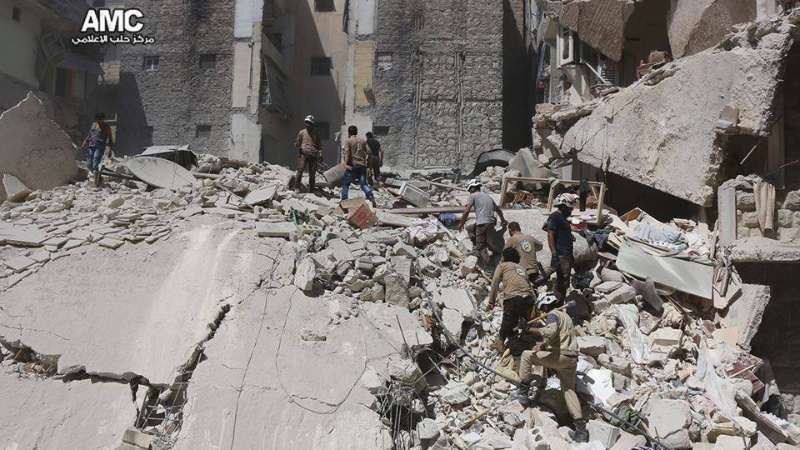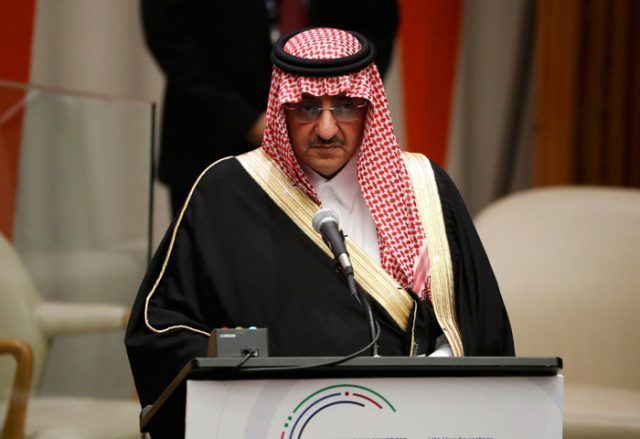
Representatives from Russia, Turkey, and Iran have held today a technical meeting in Kazakhstan’s capital Astana to discuss details of the implementation of the Syria ceasefire agreement and to support the upcoming peace talks in Geneva.
Russia said it has a new plan for Syria peace talks which can be achieved with powers that have a real effect on the Syrian ground after its forces backed Assad regime to achieve many victories against the opposition and tilted the tide of war in his favor.
Russia, Iran, and Turkey said they were ready to help broker a Syria peace deal, and organized peace talks meeting in Kazakhstan on January 23.
The first day of the talks was focused on ways to strengthen the ceasefire. It ended with tension as both parts traded blames over truce breaches. In addition, the opposition refused to have direct negotiations with Assad regime.
The talks have ended with Russia, Turkey, and Iran making a joint statement about the consequences of the talks and agreeing on a mechanism to support a delicate ceasefire.
Russian Foreign Minister Sergey Lavrov said last week that a tripartite mechanism was established by the three countries to monitor the cease-fire in Syria, and they will meet together on February 6 to discuss it.
“The cease-fire is largely holding. Russia, Turkey, and Iran have established a mechanism that allows them to monitor the implementation of the truce,” Lavrov said.
The agenda for the meeting, according to a spokesperson for Kazakhstan’s foreign ministry, includes a review of the ceasefire implementation, and a discussion of a proposal submitted from the Syrian armed opposition about the truce.
“This is about creating a mechanism to control the implementation of the ceasefire,” the ministry spokesman said.
Previous concerns
Turkey had concerned about this meeting before it began and abut the whole political process.
Turkey has warned Syrian opposition groups from refraining from discussing the future administrative make-up of Syria or a new constitution at the talks in Geneva on Feb. 20.
Turkish Foreign Ministry Undersecretary Ümit Yalçın met with Riyad Hijab, the general coordinator of the High Negotiations Committee, President of the Syrian National Council Enes el Abde, representatives of opposition military groups participating in the Astana talks, the Syrian Kurdish National Council, Syrian Turkmen representatives as well as some Druze and Alawite religious scholars in Ankara on Feb. 3 ahead of the new peace talks.
At the talks in Astana in January, Russia gave opposition representatives a draft version of the new Syrian constitution and a blueprint promoted by Moscow as offering a possible solution to the conflict.
But a Turkish foreign ministry source said they “pointed out that bringing up the future administrative system of Syria at the moment and attempting to start a discussion on issues such as a new constitution, autonomy or federalism could risk serving the purposes of those who pursue unilateral agendas.”
“These kinds of attempts should be avoided as it targets current parameters for a political solution by the U.N. Security Council decision,” said the source.
The source also warned against the presence of “fake opposition” at the talks, a reference to groups deemed by Turkey to be too loyal to Bashar al-Assad favored by Moscow.
The meetings’ results
Stanislav Gadzhimagomedov, the head of the Russian delegation stated that Russia proposed two documents on control over the ceasefire regime in Syria and that observation of the ceasefire regime in Syria was also discussed
“During the first meeting, we almost completely agreed the draft position of the joint group to monitor compliance with the cessation of hostilities. Some details should be agreed in the capital. I think that at the next meeting we will sign the document,” Gadzhimagomedov, said, while a source in one of the delegations in Astana said that the mechanism was 90 percent complete.
Gadzhimagomedov also pointed out that Russia proposed two documents on control over the ceasefire regime. The first paper is a protocol to the ceasefire agreement focusing on conditions for the regime of cessation of hostilities as well as the parties’ responsibilities to ensure humanitarian access and to exchange of forcibly held persons. The second one is a statute on the reconciled settlement that is designed to stabilize situation in besieged areas as soon as possible.
“These documents are complicated and, of course, need to be adjusted by both Syrian government and opposition,” Gadzhimagomedov said.
He also expressed a hope that the next joint task force (JTF) session would elaborate on the proposed papers.
“The participants of the meeting discussed the progress of implementation of cessation of hostilities in Syria, special measures to establish an effective monitoring mechanism and control … The participants also discussed the measures of mutual confidence and ensuring unimpeded humanitarian access,” Gadzhimagomedov added.
He pointed out that the number of ceasefire violations was decreasing.
“The violations still occur, but their number has decreased significantly, and we agreed to continue work on this issue to stop these violations and provocations completely,” the Russian delegation’s head said.
Gadzhimagomedov added that Jordan’s representatives had reported southern Syrian opposition units were ready to join the ceasefire regime and to fight against terror groups such the Daesh and Jabhat Fatah al Sham (formerly known as the Nusra Front), both outlawed in Russia and a number of other states.
The Syrian crisis began as a peaceful demonstration against the injustice in Syria. Assad regime used to fire power and violence against the civilians and led to armed resistance. 450.000 Syrians lost their lives in the past five years according to UN estimates, and more than 12 million have lost their homes.



